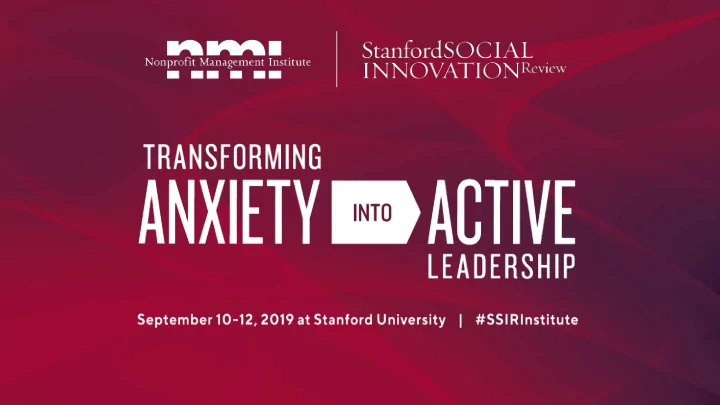

Hillary Frances Dan Reed Program Designer, Seed CEO, Seed Fundraisers Fundraisers @SeedFundraisers @SeedFundraisers
Leading Non-Anxious Organizations The Impact of Emotional Differentiation on Organizational Identity, Fundraising, and Program Design
Today’s outcome Gain the ability to both identify the indicators of organizational anxiety as well as take the first step to become a non-anxious leader within : 1. Organizational identity 2. Fundraising strategies 3. Program design
Family Systems Theory: an organization is a cohesive emotional unit; an individual’s emotional processes cannot be isolated from the relational system in which they participate; therefore, emotional processes are “contagious” within an organization.
Anxiety: the emotional response of intensifying fear within an organism to a threat, real or imagined. Organizational Anxiety: the level of transferred anxiety from one individual to another within an emotional system. When one’s anxiety intensifies, everyone’s anxiety intensifies. Not until a non-anxious presence is introduced to the system can the virality of anxiety be reversed
Indicators That You’re Leading an Anxious Org. ● Reactivity : immediate emotional reactions; the inability to be calm/playful ● Herding : to accommodate the least emotionally mature; becomes intolerant to individuality and conflict for the sake of “togetherness” ● Blame-shifting : defers to others the responsibility of the problem/solution ● Quick fix mentality : seeking quick relief from pain, resulting in a low threshold for discomfort ● Leadership fatigue : leaders react, lose vision, and cave to criticism
Organizational anxiety unclear answer to the question “ to what Organizational identity end do we exist? ” Fundraising revenue > relationships day-to-day activities are not designed to Program design achieve stated missional promises
REFLECTION
Non-Anxious Leadership Leans Out ( emotional differentiation ) ● Calmly assesses reality in the face of conflict and rejection ● Self-validates ● Uses thoughtful principles to guide decision-making ● Supports others views without becoming a devout evangelist ● Rejects views/ideas without polarizing the differences ● Well-defined without being pushy
Non-Anxious Leadership Leans In ( relational connection ) ● Practices presence with others ● Avoids dis-association ● Realizes realistic interdependence on others ● Honestly addresses conflict with others ● Empathizes without enmeshment
The Emotionally Healthy Organization Organizational identity defined and limited purpose for being Fundraising commitment to long-term strategies clear solutions for singular problems Program design
Emotionally Healthy IDENTITY ● Organizational “direction” decisions are not outsourced to collective opinions. ● Saying “no” is the default response to adjacent opportunities. ● All staff members have the same understanding of the organization’s purpose. ● There exists a “white hot center” of avid support.
Emotionally Healthy FUNDRAISING ● Donor relationships are prioritized over financial transactions. ● Fundraisers are confident in their asks. ● Fundraising strategies are committed to in years, not months. ● Fundraising is treated as an integrated activity of the business rather than a necessary evil that can’t be avoided.
Emotionally Healthy PROGRAM DESIGN ● Targeted outcomes achieve transformational results. ● Clarity of purpose is understood by all. ● Programs are well-defined with an easy answer to what we do and don’t do. ● Programmatic decisions are unaffected by donor wishes.
CASE STUDIES
SEED FUNDRAISERS www.seedfundraisers.com DAN REED HILLARY FRANCES CEO, Seed Fundraisers Program Designer, Seed Fundraisers dreed@seedfundraisers.com hfrances@seedfundraisers.com
Recommend
More recommend